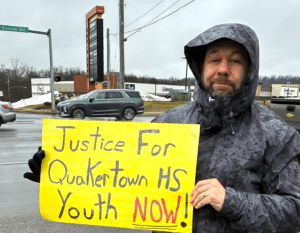I was hoping to write an article today about how the Bucks County Beacon came home from Austin with independent publishing awards, but instead I’m coming to you with deep gratitude for the news ecosystem in which we are participating. Last weekend, I attended the Lion Publishing Awards, during the first of its kind Independent News Sustainability Summit. We were a finalist in two categories – Community Engagement and New Lion Business of the Year. Throughout the evening, I was struck by the dedication and hard work that is being done by independent publishers around the country.
As someone who didn’t grow up wanting to be a journalist, and someone who didn’t go to journalism school, I hadn’t been closely watching the consolidation of media ownership. Media consolidation started in the late nineties, when the FCC began to change the rules of media ownership, and the consolidation continued into the early 2000s with more relaxation of the rules. What resulted were massive mergers where most newspapers and broadcast stations are now owned by a handful of corporations.
Let’s take Gannett as an example. Gannett was started by Frank Gannett in Rochester, New York, in 1923, as an outgrowth of the Elmira Gazette, which started in 1906. Through the years, Gannett bought small independent papers throughout the country, creating a large newspaper chain. By 1979, Gannett owned 79 newspapers throughout the country. The consolidation of Gannett continued throughout the 80s till now, with Gannett buying other media companies like Combined Communications Corp., Belo Corporation, London Broadcasting Company, Journal Media Group, and others. By 2014, Gannett announced its split into two publicly traded companies – Gannett and Tegna. Gannett would be the newspaper arm, while Tegna would be digital and broadcast. From there, Gannett was acquired in 2019 by New Media investment Group, which is owned by Fortress Investment Group, which is owned by Japanese banking conglomerate, Softbank.
So, what does this mean for the average newspaper or online news reader?
The likelihood is that your newspaper is owned by a corporation or a bank, or maybe even a private equity firm. The thing about corporations is that their aim is profits. News is often not profitable. It takes time, talent, and deep local knowledge. When a company consolidates a news business across the country, there ends up being less local reporters, less concern about the people in local markets, and less coverage of the news that is important to the residents of the area.
What’s more concerning is that many areas have since become news deserts, places where there is no local paper, and local stories just don’t get coverage. The other problem with focusing on profits rather than news, is that news becomes a formulaic pursuit of profits. Stories that get the most views continue to be told, while other, less flashy stories fall to the wayside.
This weekend, I saw something entirely different.
I met a woman who runs a hyperlocal news website in Lincoln, Massachusetts, called the Lincoln Squirrel. Lincoln is a suburb of Boston, and the news they receive is from the Boston Globe. Understandably, local news in Lincoln wasn’t being covered by the Globe, so Alice started her own news website to keep the local community informed.
I met a man who runs a hyperlocal news website in Southlake, Texas, called the Southlake Independent. Southlake was featured in some national news coverage, and didn’t tell the whole story of the community he loves. He chose to start covering local stories– good news stories– about the things that are important to local residents.
The award winners are really doing some remarkable work. Here are just a couple of examples:
Enlace Latino NC is a Spanish language news website in North Carolina, dedicated to serving the Latino immigrant population throughout North Carolina, focusing on immigration issues, state government affairs and policy, and community. Beyond that, they work to give their readers information on empowering movements within the state that can benefit the community. They won three awards on Friday.
Kansas City Defender won the award in our revenue tier for community engagement. Their website focuses on covering and amplifying Black stories, community building and organizing. They cover justice, education, arts & culture, and business, focusing on the Black community.
Santa Cruz Local won multiple awards, in part for their community listening techniques and reporting on the stories that are important to the community. They won an outstanding coverage award for reporting a series of stories on the homelessness crisis in Santa Cruz county.
While there are too many organizations to list in this article, check out the list of all the winners here.
The reporting that is being done by independent publishers is important work. Many of the stories aren’t covered by the corporate media until after the hard investigations are completed by small independent publishers.
The Independent News Sustainability Summit wasn’t just about getting the story, but about how to sustain independent news organizations long term. All of the publishers face a similar problem, regardless of size – how do you fund the organization long-term? How do you create and foster a sustainable workplace and avoid burnout? And how do you create equity, both in your reporting and in your organization?
I learned a lot about how to help the Beacon achieve sustainability this past week. We will be implementing strategies to continue to grow the Beacon in all of these aspects, but we also need your help. One of the best ways to support the continued growth of the Beacon is with community funding.
Please consider becoming a monthly contributor.






